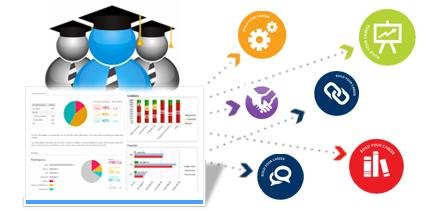The digital transformation of the university is creating a unique and highly specialized vertical within the broader enterprise software market. The Higher Education Student CRM Systems industry is a mature ecosystem with its own unique set of business processes, data standards, and competitive dynamics. The industry's projected growth to $13.7 billion by 2032, at a steady 11.84% CAGR, reflects its deep and mission-critical role in the core operations of colleges and universities. The industry is defined by its focus on managing the entire student lifecycle, a concept that is unique to this sector and requires a purpose-built approach to technology. Understanding the distinct characteristics of this vertical is key to appreciating the challenges and opportunities for the vendors and institutions that operate within it.
The structure of the industry is heavily influenced by the unique operational model of higher education institutions. Unlike a typical for-profit business, a university has multiple, distinct "customers" and a very long and complex "customer journey." The same individual can be a prospective student, an applicant, an enrolled student, and, finally, an alumnus and potential donor. Each of these stages involves different departments, different business processes, and different data needs. A successful CRM in this industry must be able to support all of these distinct phases and provide a seamless, unified view of the individual as they transition through their lifelong relationship with the institution. This lifecycle-centric approach is the defining characteristic of the higher education CRM industry and is what separates it from a generic, commercial CRM.
The industry is also characterized by long sales cycles and a strong emphasis on community and peer recommendations. The decision to purchase and implement a new CRM is a major, multi-million-dollar investment for a university that will impact the entire institution for a decade or more. As a result, the selection process is often long and involves a large committee of stakeholders from across the campus. In this environment, a vendor's reputation and the success of their existing clients are incredibly important. The higher education community is tightly knit, and decision-makers rely heavily on references and recommendations from their peers at other institutions. This makes building a strong track record of successful implementations and maintaining high levels of customer satisfaction a critical success factor for any vendor in the space.
Looking forward, the industry is facing a number of transformative forces. The rise of online and hybrid learning models is creating new challenges and opportunities for student engagement and support. The increasing use of data analytics and artificial intelligence is enabling more proactive and personalized student interventions, but it also raises important questions about data privacy and ethics. The growing demand for lifelong learning and alternative credentials is forcing institutions to rethink their traditional degree programs and how they engage with learners over the course of their entire career. The vendors in the higher education CRM industry who can successfully adapt their platforms to support these evolving models of education will be the ones who are best positioned to lead the market in the future.
Explore Our Latest Trending Reports:
Cyber Security Training Market

